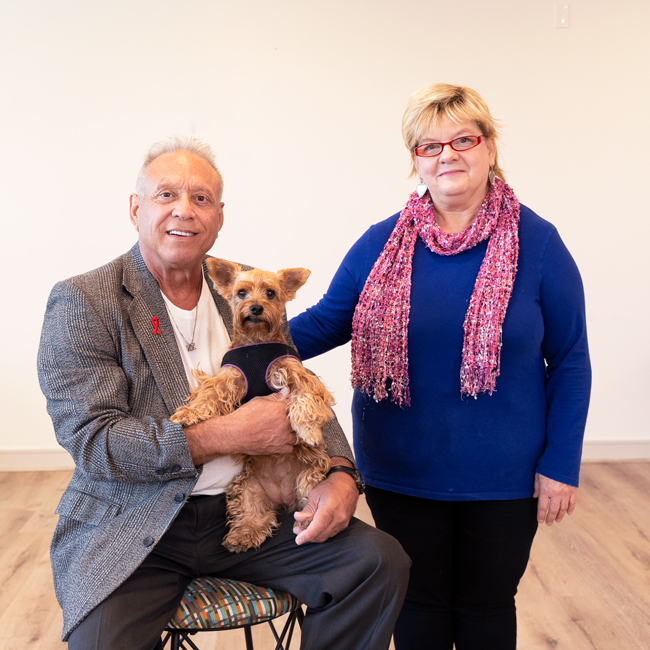
Senior Outreach
Jereme Scott and Ruth Atkinson empower older survivors at HIV & Aging Coalition, Houston.

While living with HIV presents challenges regardless of one’s age, older people impacted by the virus face different issues than their younger counterparts, according to Jereme Scott, chair of the nonprofit HIV & Aging Coalition, Houston.
The activist and HIV survivor of 37 years says HIV-positive seniors often face greater social isolation and loneliness. “Stigma is also a particular concern among older people living with HIV. Stigma negatively affects people’s quality of life, self-image, and behaviors, which may prevent them from revealing their HIV status or seeking HIV care.”
The HIV & Aging Coalition exists to combat these challenges. The peer-led educational and social program was first conceived for HIV-positive people over the age of 50, but it now welcomes all people who have lived with HIV for over 20 years. The group will soon be coming together again for Lights of Love at the Montrose Center on December 12.
A Forgotten Generation
During the early years of the HIV/AIDS epidemic, people who were diagnosed with HIV or AIDS could expect to live only one or two years. According to HIV.gov, this meant that the issues facing those who began aging with HIV were not a major focus at the time.
Today, thanks to the effectiveness of HIV medicine (called antiretroviral therapy, or ART), people with HIV who are diagnosed early and stay on ART can keep the virus suppressed and live long, healthy lives. For this reason, over half of people living with diagnosed HIV in the United States are now 50 and older, according to the latest report by the Centers for Disease Control and Prevention (CDC).
“We celebrate and honor those who have survived and continue to live strong and productive lives in this dynamic world of ours. Until there is a cure, HIV is just one more aspect of living and aging well.”
While most of this population has been living with HIV for decades, others were diagnosed with HIV later in life. HIV.gov notes that older Americans are more likely than younger Americans to be diagnosed with HIV late in the course of their disease, meaning they get a late start receiving the benefits of HIV treatment and possibly incur more damage to their immune system. This can lead to poorer prognoses and shorter survival after an HIV diagnosis. Late diagnoses can occur because healthcare providers may not always test older people for HIV infection. Older people may also assume that HIV symptoms are just signs of normal aging, so HIV screening is never discussed during medical exams.
Scott fears that long-term survivors of HIV are “a forgotten generation,” and hopes that the Houston Coalition can help change the narrative for local HIV-positive seniors.
“We want to bring people out of their closets and back into the community,” he says. “We celebrate and honor those who have survived and continue to live strong and productive lives in this dynamic world of ours. Until there is a cure, HIV is just one more aspect of living and aging well. [So the Coalition] will continue to support, educate, and provide a little laughter along the way.”
Women and HIV
Of the one million people living with HIV in the U.S., 258,000 (about 23 percent) are women, the CDC reports. Women also account for about one in five of new cases in the nation. These women face unique challenges in accessing optimal care and resources, says Coalition founding member Ruth Atkinson.
Atkinson had lived with HIV for nine years before a doctor finally diagnosed her condition correctly in 2005. She has had an undetectable viral load for nine years now, and works as a mentor to several local HIV-positive women, helping them navigate the HIV care system.
Women 45 and older make up more than a third of all women who are living with HIV, according to the CDC. Atkinson says a majority of her clients over the age of 60 are “hidden in their homes and often are not willing to discuss.”
Atkinson says it is crucial for organizations like the Coalition to provide support for aging people living with HIV. “We need to provide education. [An entire generation living with] HIV is graying,” she says. “Older people don’t want to feel like they have been put on a shelf. We can mentor the younger generation.”
Changing the Narrative
While the HIV & Aging Coalition was not operational during the 2020 COVID restrictions, Scott and a committee of five people met weekly for several months to reorganize the group into a fresh “new” organization that now welcomes younger people who have been living with HIV for at least 20 years. Scott is also working to diversify the organization, and hopes to soon increase transgender and Black representation on his committee.
The revitalized Coalition will kick off next month with its first Lights of Love ceremony at the Montrose Center. The event will provide people with the opportunity to remember and honor those who have died from HIV-related illnesses. Each honoree will be acknowledged with a personalized tree ornament whose inscription will be read aloud as it is placed on the Lights of Love holiday tree. Their names will also be printed in the event’s programs and commemorative T-shirts. The Coalition plans to make this an annual holiday event.
Those who would like to sponsor an ornament for a deceased honoree should contact the Coalition by December 1. The cost for individuals is $5, and organizations can become sponsors for $100. T-shirts will be available for $15.
For more info, visit agingcoalition.org, email [email protected], or call 832-875-9233.
This article appears in the November 2021 edition of OutSmart magazine.











Comments